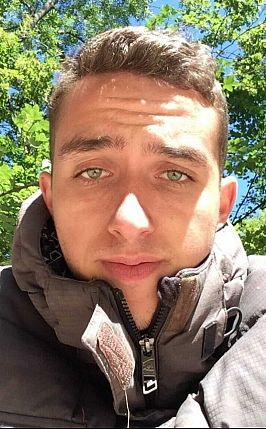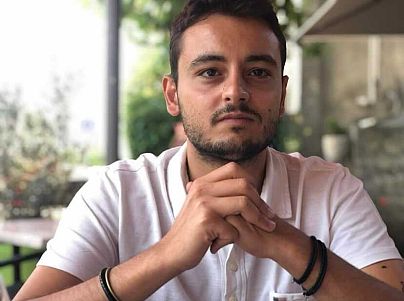From disliking the candidates to a lack of trust in France's system, four young people explain their decision not to go to the polls.
Gaspard Hermann, a 24-year-old steeplejack currently working in the French Alps, is one of many young people in France who decided not to vote in the presidential election.
 ADVERTISEMENT
ADVERTISEMENT
 ADVERTISEMENT
ADVERTISEMENT
He told Euronews that among the reasons he isn’t voting is because the French are often forced to vote against a candidate instead of for an individual they support.
It’s a recurring concern among those who will take to the polls on Sunday 24 April to choose between far-right candidate Marine Le Pen and centre-right incumbent Emmanuel Macron.
Several of the presidential candidates who lost in the first round urged their supporters to vote for Macron in an effort to “block the far-right” from governing the country despite their disagreements with the president.
Far-left candidate Jean-Luc Mélenchon, who came third in the election, told his supporters not to vote for Marine Le Pen, without specifying whether he would vote for Macron or abstain while Workers’ Struggle candidate Nathalie Arthaud, who finished last of the candidates, said Macron and Le Pen were both “enemies” and that she would vote blank.
For some young people who have chosen not to vote in either round of the presidential election, the problem, they say, is that France’s system doesn’t represent them.
“I don't see myself in the current presidential system or in the way it works, in particular, its failure to take into account abstention and blank votes, or the choice of candidates,” said Louise, a 28-year-old who works in development for a group of towns outside of Lyon.
She preferred that her last name not be used because she works in public administration.
“I won't vote in the second round. I always ask myself the question of the first round as there are more candidates who could correspond to make my voice heard. But in the second round, I don’t want to choose between the plague and cholera.”
She’s one of many young people between the ages of 18 and 34 who did not vote in the presidential election.
While voter turnout is typically higher during France’s national elections than in local or regional elections, it was nearly at its lowest this year compared to previous presidential races with more than a quarter of registered voters not going to the polls in the first round.
"The abstention rate in France was higher than in 2017 (the last election)," said Tristan Haute, a senior lecturer in political science at the University of Lille. But, he said that it could have been worse given the COVID-19 pandemic and the war in Ukraine which impacted the campaign.
Among young people ages 25-34, the abstention rate was 46%, according to an Ipsos poll following the first round, while among young people ages 18-24, the abstention rate was 42%. A further report about abstention is expected later with more data from the polls.
"For younger generations, the relationship to voting is different, it is more intermittent. Voting is seen as a less effective participation practice," said Haute, who studies abstention, adding that there are always multiple factors to explain it.
"You have people who don't feel legitimate politically, who won't vote because they don't feel represented, or those who don't feel competent politically to give their opinion," he said. Abstention is also higher among the working class.
"The less qualified voters are, the more they face precarious work contracts or unemployment, the more they will abstain. There is a link between social exclusion and political exclusion," Haute says.
Hermann, the steeplejack working in the Alpine resort of Tignes, says that there aren't politicians who do manual labour and that they thus don't understand his situation and that of his friends.
He says that many politicians have done the same studies and don't know what it's like to need to work every day to make a living. He's also angry that politicians don't carry out their promises.
Maxime Bricaud, a 21-year-old carpenter, agrees that politicians aren’t helping people in the working classes.
“People are not interested in us, people in the working class and those who are underprivileged… They do a lot for people who have more money,” he said, adding that young people aren’t taken seriously even though “we’re the future of the country.”
“(Politicians) don’t do much to help make our lives easier,” he said. “They don’t prepare us for professional life and they just want us to work more.”
He says there haven’t been many changes in politics that could make him become interested in it.
“It’s often the same candidates for I don’t even know how many years,” Bricaud said.
Adrien Humbert, who works in marketing in Lyon, had a different take on his choice not to vote in the French elections.
Humbert said he doesn’t “really believe in political action or at least in the benefits of political action.”
He says that for him the only important thing is the environment but that the Greens wouldn’t have had any chance in the presidential election anyway.
The Green Party finished the first round on 10 April below the 5% threshold, meaning they have to reimburse their campaign fees.
Humbert said that Macron will likely win the election so “my vote wouldn’t change much.”
Though he mentioned that he knew people who were trying to convince him still to vote for Macron in the second round against Marine le Pen.
But he added that the French population isn’t ready for the environmental changes that he thinks are needed.
“It is not a political question, it is a question of personal will…for me, the action is more individual and the individual (only) changes if we educate them.”












